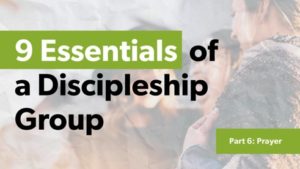Raise the Bar of Discipleship
The following content is an excerpt from the eBook Fill Your Seats. Download your free digital version in your favorite format here.
For years, I’ve defined a disciple as a “learner and follower” of Jesus. In theory, if someone really follows Jesus, they will end up helping others to become learners and followers. But the reality is they rarely do. Somehow, we get selfish saying things like, “I have my salvation, my church, my small group, my Bible, my eternal security.” Moving beyond “me and mine” is hard.
Reading Discipleship.org’s definition of a disciple showed me how weak my definition was. He says a disciple is “a person who is following Christ, being changed by Christ, and is committed to the mission of Christ.” That’s raising the bar! Let me “put some meat on those bones” from my perspective:
Following Jesus – A disciple of Jesus is living his way of life. It’s a lifestyle marked by love, acceptance, forgiveness, grace, and joy. Following Jesus says my heart breaks for the things that break His heart. There’s a love for His Word, for worship, and for learning—a love for the church and for meeting together with other Jesus followers. Most of all, there’s a love for others. Following Jesus is an active thing. It requires engagement and involvement, not just participation and attendance.
Being changed by Jesus – A disciple is humble, the opposite of prideful and self-righteous. A disciple is open to the Holy Spirit, who lives within them and offers access to the mind of Christ. A disciple of Jesus has an open mind and heart, inviting God to “peel their onion” to expose their dark and blind spots and to heal their broken places. Disciples aren’t about self-improvement; they’re about finding parts of their hearts not yet surrendered and turning them over to their Heavenly Father for His use and glory.
Committed to Jesus’ mission – So here’s the “biggie,” the one forcing us out of me and into we. Here’s when we move from being a disciple to making disciples. This one can’t be done in the privacy of your prayer closet; it can only be activated with action. I call it “the outward turn”—it’s a shift in focus from being “about me” to engaging in your unique calling to help others. Some say anything we do to help someone else is, in a small way, disciple making. That’s pretty generous, but it’s true to a degree. My sense is that Jesus cast a much narrower vision, one of intentionally building relationships with the purpose of helping others find and follow Him.
This comes from the free eBook Fill Your Seats, which you can download here.
So, let’s get practical. How do we raise the bar in stimulating interest in discipleship and disciple making? Here’s what I’ve seen work:
Lay out an intentional process (not a class) with a specific beginning date and ending date but with flexibility to engage personally, one with another.
Create a high-trust environment through sharing testimonies and life stories with transparency and vulnerability.
Make attendance, punctuality, and homework assignments mandatory.
Select a leader (or leaders) from whom people would be honored to learn.
Invite specific people to apply, then review and pray over the applications; select only those to whom the Lord leads you; make it an honor to be selected and mentored.
Follow Jesus’ model: assign, send out, have them come back, and debrief.
Do all this in a group setting, just like Jesus did, but recognize that much of the life-change will happen in one-on-one encounters outside the group.
Have everyone sign an agreement spelling out the commitment they’re making to the group, to the leader, and to each other.
Make sure the agreement includes a provision engaging each apprentice/disciple/mentee to pay it forward to others within a specific timeframe after they complete the mentoring season.
Will this mean smaller numbers? Probably. . . at least at first.
Will it mean more committed, intentional disciple makers in the end? Absolutely.
How do I know this will work? Because it’s what Jesus did; it’s what I’ve done for the last eighteen years; and it’s what over one-hundred sixty churches are now doing—with fantastic results. All glory to Jesus!
Now you don’t have to do this exactly as I’ve described. But our friends at NewSpring Church in Anderson, South Carolina, follow this model closely. They had the following results to share from their survey of the twenty-nine people who just finished their mentoring season. Don’t take my word for how effective this type of mentoring is: read for yourself!
Because of the mentoring group experience, my walk with God has… Improved Significantly or Improved: 100 percent.
Because of the mentoring group experience, my marriage has… Improved Significantly or Improved: 96.4 percent.
Because of the mentoring group experience, my immediate family relationships have… Improved Significantly or Improved: 89.3 percent.
Because of the mentoring group experience, my giving to the church and other Christian ministries has… Increased Significantly or Increased Somewhat: 57.1 percent.
During the mentoring season, the guys in my group opened up to each other… Yes: 100 percent say they did.
During the mentoring season, I experienced authentic community with the guys in my group… Yes: 100 percent.
Every single graduate signed a covenant that he would go and personally make disciples. Their church is now working hard to engage them as disciple makers in various places within the church’s programs. They’re no longer parking cars; they’re engaged in life-on-life kingdom work.
Written by Regi Campbell
Regi Campbell grew up in a small-town church. He’s belonged to congregations in multiple cities and gotten to know a quite a few pastors and churches. For the past twenty-three years, he’s been a part of one of America’s largest churches, Andy Stanley’s North Point Community Church serving as an Elder twice and in other leadership roles. His first three books—About My Father’s Business, Mentor Like Jesus, and What Radical Husbands Do—speak to business people, mature men, and husbands respectively. Campbell now speaks to Senior Pastors, Staff Pastors, and leaders in the local church, sharing what he’s learned about creating interest in discipleship and disciple making.
Regi is the Founder and Chairman of Radical Mentoring, a nonprofit focused on equipping and encouraging churches to build disciples and disciple makers through intentional men’s small group mentoring. Regi believes the future of the local church is intimately connected to the development of strong Jesus-following lay leaders who will lead their wives, children, businesses, neighborhoods, and churches with God at the center.





